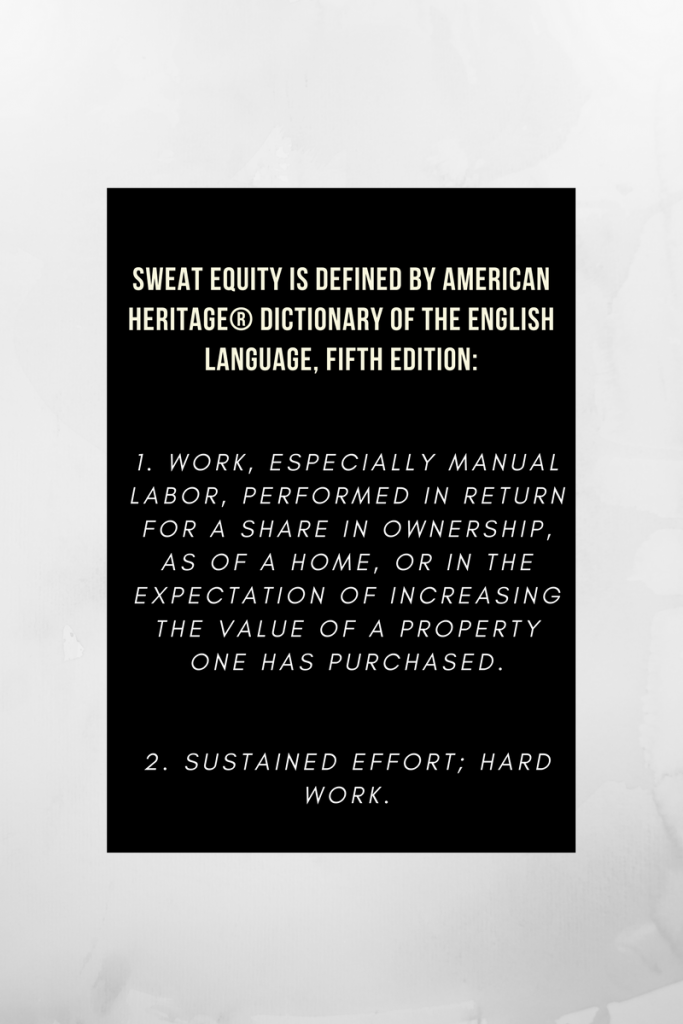
Sweat Equity – a good alternative to spending cash
by Vera Remes
I have said more than once, I am a “sweat equity kinda gal.” Borne out of necessity as a young person on a limited budget, and now as an old person on a limited budget, sweat equity was a good alternative to spending cash that could be earmarked for other purposes. But what is sweat equity, exactly, and how can it work for you?

What is sweat equity?
Sweat equity seems to be the currency of the future and it serves many purposes. It is a way for someone to advance in life, doing something they love to do and are good at. It is also, as I have found, a way to have a unique job experience that teaches skills that will survive the experience.
I’ll give you a personal example. I am on a Board of Directors of a small non-profit corporation. As a Board Member, I am expected to make donations to the corporation financially, as well as spend time fundraising. At this stage of my life, I am financially unable to make any large donations, or to do the grunt work that fundraising can entail. One of my talents, however, is that I practiced law for 31 years. Instead of donating money, I have rewritten the corporation’s by-laws and employment contracts, negotiated contracts on their behalf, and helped with program development. I am a contributing member of the Board, respected by my fellow Board Members, and doing what I love to do at the same time. Win, win, win.
Getting Started
First, set your goals. Do you want to own a business or want a promotion in the company you work in? Do you want a job, car, vacation, an adventure? The first step is to determine what you want.
Second, assess your strengths. We all have skills, tapped and untapped skills—child care, crafts, culinary skills, construction skills like electrical or plumbing, writing skills, management and organizational skills.
Third, find a situation where those strengths can be parlayed into what you want in life.
For example, if I want an equity position in a new business, but have no capital, I need to assess what strength of mine this business entity is in need of, and how I could fill it. There are business formulas to implement these arrangements. The value of part of your services can be assigned to your equity position with a percentage paid as a cash salary. Downloadable forms, such as this one from LegalZoom, are available that contain formulas for these kinds of arrangements. After a set amount of time and effort, your equity interest will be fulfilled and you are an “owner” with little or no cash outlay.
Sweat equity is not always a straight line

Sweat equity is not always in a predictable straight line. Photo by Charla Dury
Don’t be dissuaded if the set-offs aren’t direct. A daisy chain of events can lead you to your goal. You need a “new” used car. You find the perfect one you can’t afford. However, you can knit up a storm, do crafts, or make Christmas wreaths to sell for money toward that cause. Just like saving up for a prom gown in high school by babysitting.
A good example of this is “Barter Kings,” an American reality television series on A&E which featured two entrepreneurs as they trade items for better items without any currency exchange. The trade for the item they want is never a straight line, and there are often many exchanges in between the item they started with and the end result.
Another television show, “Down East Dickering” is a History channel reality series about a throwback barter-and-haggle economy.
A New York Times article describes it as “a sort of free ad for a publication full of ads: Uncle Henry’s Weekly Swap or Sell It Guide, in which people list junk that they’re trying to sell, jobs that they’re looking to have done and so on. The focus is on a group of men who apparently do little more than peruse Uncle Henry’s for opportunities from which they can wring a small profit by buying and reselling, or some other form of barter.”
However the form of barter happens, whether planned, on-the-fly, or initiated by someone else, the important thing is to formulate a plan and stick to it.
Unique manifestations of sweat equity
Finally, in order for sweat equity to work, you have to think outside the box. Do you want a unique job experience that teaches skills that will survive the experience? This is a situation where you trade your labor to acquire either an enjoyable life experience, new skills, a place to live. Sometimes these arrangements are not as concrete as bartering a skill or item for another item, but they can offer an invaluable skill set or experience in return for a little time, energy and ingenuity.
“Working” the dream
For those who really want to avoid a “normal” job, EscapeNormalJobs.com lists “Adventure Jobs.” These are really volunteer opportunities in areas like Peru, Costa Rica, New Zealand, South Korea, British Columbia, and California. Besides room and board, the volunteer usually earns a small stipend in exchange for performing a variety of tasks that can range from food preparation to accounting, but executed in an exotic setting.
Vacation sweat equity style
Those of us that live near New York City or down the Jersey Shore there’s Home Exchange. With Home Exchange, people vacation in other people’s houses. This creates a travel experience that costs little more than the price of travel and food. You can exchange your house near NYC for a week or two for a villa in Spain. It’s like having a timeshare, but without the crazy.
Living for pennies
Sites like Apartment Exchange, based out of the St. Louis area (but they’re everywhere), list professional property management opportunities where you can live on site rent-free if you agree to monitor and maintain the premises, leaving a lot of time and funds available to achieve other life goals and dreams.
There are many other opportunities that allow you to live rent free. Kiplinger suggests the following:

Sweat equity, as I learned, comes in a variety of packages. These opportunities can be an attractive alternative to starting a nine to five job straight out of college. They can also be a way to spend retirement when the kids have grown and you have an empty nest.



 Offer something more by giving sweat equity—the alternative to actually giving cash Photo by JoAnna Schillaci
Offer something more by giving sweat equity—the alternative to actually giving cash Photo by JoAnna Schillaci  Offer something more by giving sweat equity—the alternative to actually giving cash Photo by JoAnna Schillaci
Offer something more by giving sweat equity—the alternative to actually giving cash Photo by JoAnna Schillaci